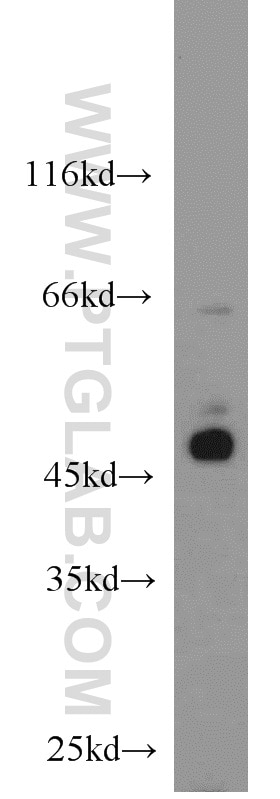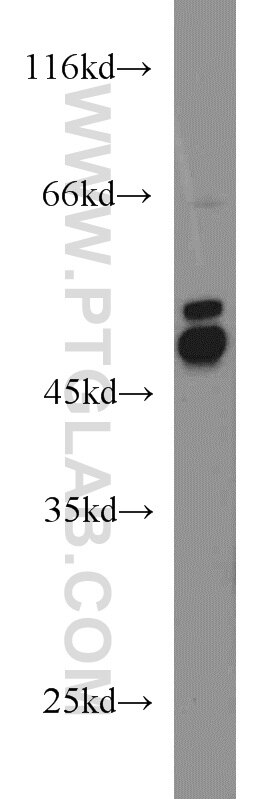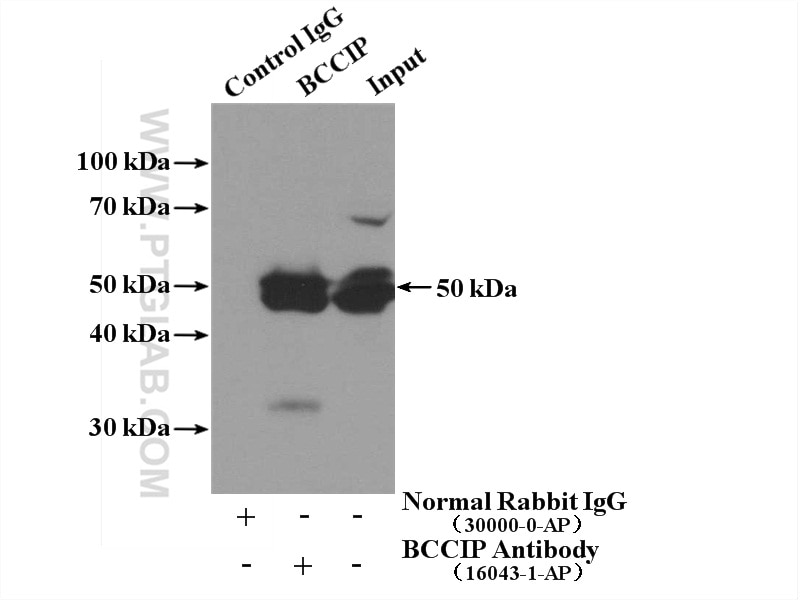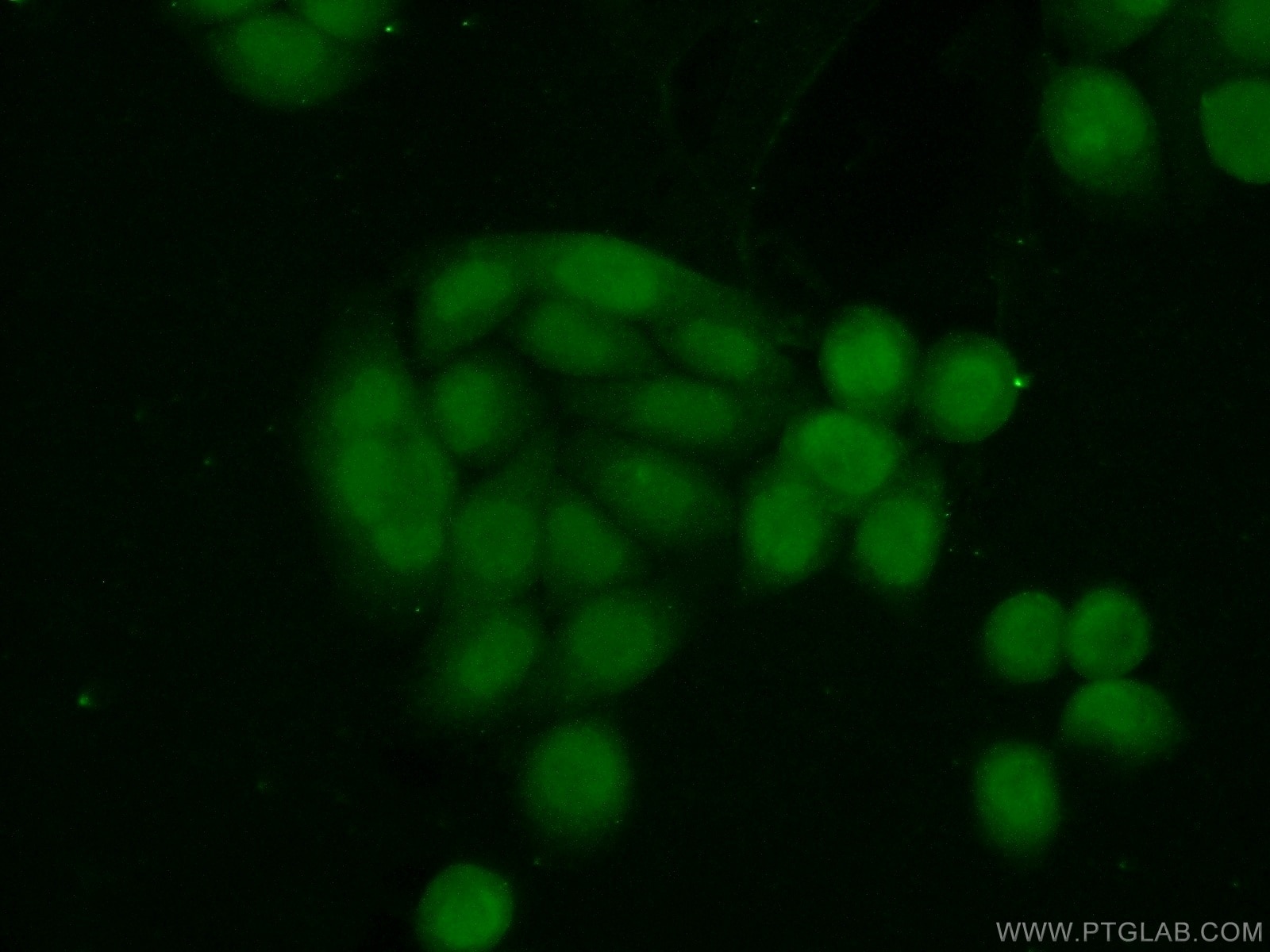- Phare
- Validé par KD/KO
Anticorps Polyclonal de lapin anti-BCCIP
BCCIP Polyclonal Antibody for WB, IP, IF, ELISA
Hôte / Isotype
Lapin / IgG
Réactivité testée
Humain, rat, souris
Applications
WB, IHC, IF/ICC, IP, ELISA
Conjugaison
Non conjugué
N° de cat : 16043-1-AP
Synonymes
Galerie de données de validation
Applications testées
| Résultats positifs en WB | cellules HeLa, cellules A549 |
| Résultats positifs en IP | cellules HeLa |
| Résultats positifs en IF/ICC | cellules HeLa |
Dilution recommandée
| Application | Dilution |
|---|---|
| Western Blot (WB) | WB : 1:500-1:1000 |
| Immunoprécipitation (IP) | IP : 0.5-4.0 ug for 1.0-3.0 mg of total protein lysate |
| Immunofluorescence (IF)/ICC | IF/ICC : 1:50-1:500 |
| It is recommended that this reagent should be titrated in each testing system to obtain optimal results. | |
| Sample-dependent, check data in validation data gallery | |
Applications publiées
| KD/KO | See 2 publications below |
| WB | See 7 publications below |
| IHC | See 1 publications below |
| IF | See 3 publications below |
Informations sur le produit
16043-1-AP cible BCCIP dans les applications de WB, IHC, IF/ICC, IP, ELISA et montre une réactivité avec des échantillons Humain, rat, souris
| Réactivité | Humain, rat, souris |
| Réactivité citée | Humain |
| Hôte / Isotype | Lapin / IgG |
| Clonalité | Polyclonal |
| Type | Anticorps |
| Immunogène | BCCIP Protéine recombinante Ag8934 |
| Nom complet | BRCA2 and CDKN1A interacting protein |
| Masse moléculaire calculée | 314 aa, 36 kDa |
| Poids moléculaire observé | 50-58 kDa |
| Numéro d’acquisition GenBank | BC009771 |
| Symbole du gène | BCCIP |
| Identification du gène (NCBI) | 56647 |
| Conjugaison | Non conjugué |
| Forme | Liquide |
| Méthode de purification | Purification par affinité contre l'antigène |
| Tampon de stockage | PBS avec azoture de sodium à 0,02 % et glycérol à 50 % pH 7,3 |
| Conditions de stockage | Stocker à -20°C. Stable pendant un an après l'expédition. L'aliquotage n'est pas nécessaire pour le stockage à -20oC Les 20ul contiennent 0,1% de BSA. |
Informations générales
BCCIP (or TOK1) is isolated as a BRCA2- and CDKN1A (p21)-interacting protein and is implicated in homologous recombination (HR) pathway and inhibition of DNA replication stress. BCCIP is an evolutionarily conserved nuclear protein with multiple interacting domains. BCCIP deficiency in mice impaired embryonic and postnatal neural development, causing severe ataxia, cerebral and cerebellar defects, and microcephaly, which are associated with spontaneous DNA damage and subsequent cell death in the proliferative cell populations of the neural system during embryogenesis. BCCIP is essential for maintaining the transactivation activity of wild type p53 suggesting a potential role of BCCIP in cancer etiology.
Protocole
| Product Specific Protocols | |
|---|---|
| WB protocol for BCCIP antibody 16043-1-AP | Download protocol |
| IF protocol for BCCIP antibody 16043-1-AP | Download protocol |
| IP protocol for BCCIP antibody 16043-1-AP | Download protocol |
| Standard Protocols | |
|---|---|
| Click here to view our Standard Protocols |
Publications
| Species | Application | Title |
|---|---|---|
Int J Mol Sci The Males Absent on the First (MOF) Mediated Acetylation Alters the Protein Stability and Transcriptional Activity of YY1 in HCT116 Cells | ||
Int J Mol Sci Feedback Modulation between Human INO80 Chromatin Remodeling Complex and miR-372 in HCT116 Cells | ||
FEBS J BCCIP binds to and activates its promoter in a YY1-dependent fashion in HCT116 cells.
| ||
Protein Cell Human INO80/YY1 chromatin remodeling complex transcriptionally regulates the BRCA2- and CDKN1A-interacting protein (BCCIP) in cells. | ||
Biochem Biophys Res Commun BCCIPβ facilitates p53 ubiquitination via binding with E6 protein in high-risk HPV positive head and neck squamous cell carcinoma. | ||
Int J Oncol Differential BCCIP gene expression in primary human ovarian cancer, renal cell carcinoma and colorectal cancer tissues. |





